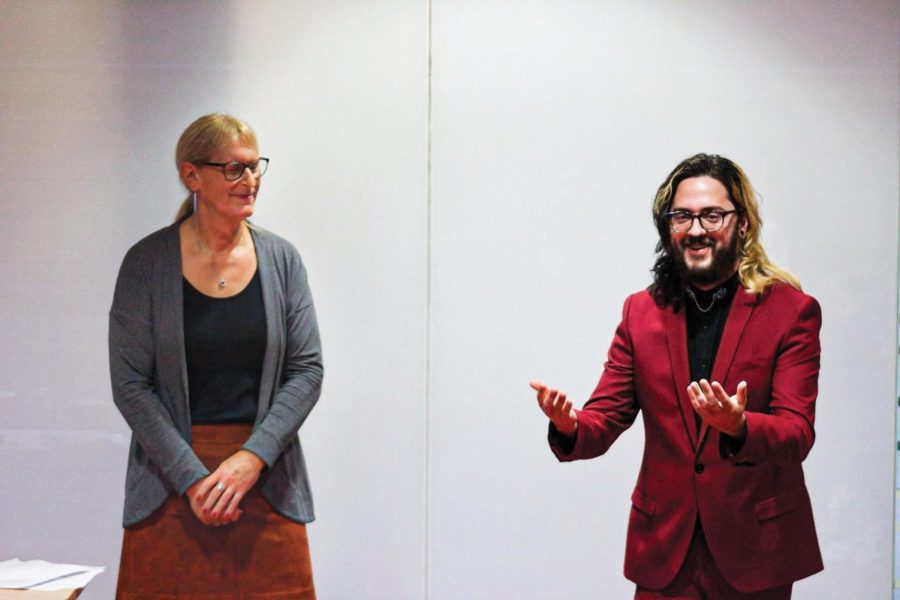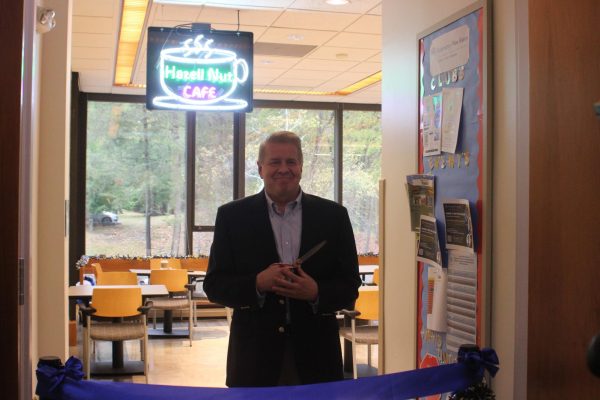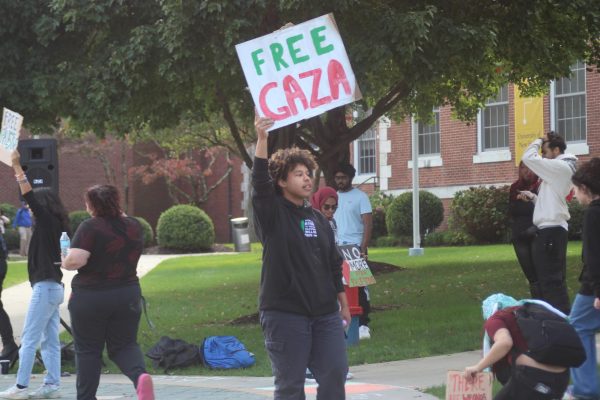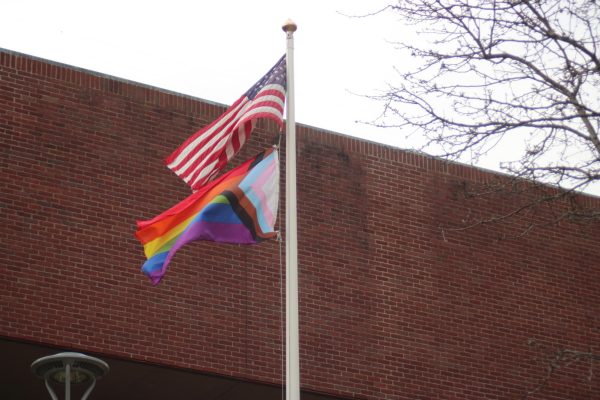Myatt Center welcomes Jillian Celentano as keynote speaker; reflects on growth and self-discovery
Photo courtesy of Charger Bulletin/Erick Cuatzo.
The Myatt Center’s Ian Shick and Jillian Celentano speak during the keynote speaker event, West Haven, Oct. 26, 2022.
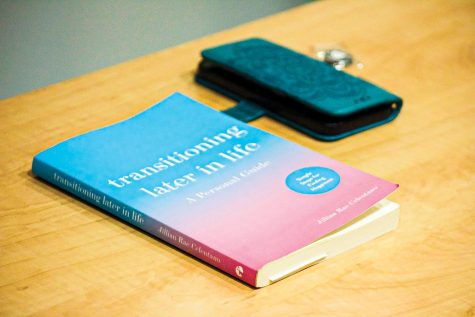
This past Wednesday, the Myatt Center for Diversity and Inclusion started the final week of LGBTQ+ history month with their first annual keynote speaker. Jillian Celentano was welcomed to the university by members including Ian Shick, assistant director for LGBTQ+ resources, Interim President Sheahon Zenger, and the newest addition to the Myatt Center’s staff, director Khristian Kemp-Delisser.
Celentano stood confidently and spoke openly before the group of university community members. She said that “my vulnerability is my strength, because if you can be vulnerable, it’s so powerful” before leading into her speech, which placed emphasis on the idea that everyone undergoes different journeys, but all individuals are ultimately seeking to be their true selves.
She said “everything that I have achieved has basically happened in the last five years. This is when I began my transition and became my true self. Before that I was just existing.”
She took the audience through a timeline of the different stages of her life, speaking openly about her internal struggles surrounding the mental health tolls of conformity and a fear of living authentically. At one point in the mental health focus of her discussion, Celentano said that “one of the things that kept me alive was that I wanted him to die, I didn’t want her to die.”
Celentano began with a reflection on her childhood, where she told the audience about how she, growing up in the 1960s, was often dismissed when she asked about being a girl. “That’s when I realized I had to start pretending. Now I have to be a boy,” she said. “ I have to be what everyone is going to expect me to be.” She could not be herself, but living up to others’ expectations was not easy.
She dove into vulnerable topics including the struggles of carrying shame in being told she was wrong in who she felt she was, and how she felt like there was something “wrong” with her.
“It is the most terrifying thing to go through the wrong puberty, but there was nothing I could do about it,” she said, as she compared growing up male as living in a science fiction movie, turning into someone she did not want to be.
Celentano also discussed her struggles with mental health, and said that she asked herself “How was I going to live the rest of my life pretending and making everyone happy?”
In her early 20s, Celentano got married for the first time, saying that she thought that it would act as a cure, because “that’s what makes you a man.” She said, however, that it was horrible for her mental health to realize “now I had to pretend to be a husband,” and divorce occurred a year down the line.
Her second marriage lasted five years. In this one, she tried to be more open, telling her wife she liked to “cross-dress,” which they agreed she could do once a month. She described the feeling of this experience as “magical” but taking it off and returning to her life as a man as “devastating.”
Both marriages ended in Celentano saying that she “fell out of love,” which she explained because she felt too ashamed of the real reason. Between these relationships, she spoke on how she dated a lot of women in an attempt to, again, “cure” herself.
She also said that she felt that she “was incapable of true love because I hated myself.”
At age 55, Jillian Celentano said the words “I’m transgender” out loud for the first time in her life.
When she came out to her therapist, in what she thought would be her last session, Celentano stood in Gehring Hall and told those in attendance, most of whom she had never met, that she wanted someone to know who she really was before she took her life.
In that moment, she was told by her therapist that she deserved to be happy. In opening up about how she had never given herself any value, Celentano said that “to hear someone else say that was so powerful.”
Celentano’s therapist convinced her to join a support group, which she said made her realize she’s not alone, and helped save her. She saw transgender people being happy, and said “those are two words I never thought could be put together” and realized “that’s what I wanted. It was like an awakening.”
At that point, at age 55, she began her gender journey. “I wasn’t going to let anyone anymore tell me who I had to be,” Celentano said. “I’m going to let the world really see me.”
Reflecting on the challenges of her transition, Celentano placed emphasis on the losses of friendships, which she felt was the hardest part of her transition, though she also said “the only regret I have is that they didn’t get a chance to know Jill” and see how happy she was.
Other challenges that she described included gender noise, body dysmorphia and gendered privilege shifts.
“I lost male privilege, and I never realized I had male privilege until it was gone,” Celentano said. She spoke on how people spoke to her differently as a woman than she had been as a man prior to her transition, discussing her feelings surrounding items like that where she felt her IQ had lowered following her transition, based on her treatment in society.
On the subject of body dysmorphia, she explained how the experiences that surround it are different for transgender people, who wish for different body parts and not just a different body image.
Celentano also reflected on what she saw as the victories of her transition, and said that “doors closed, and that allowed doors to open.”
Beyond this, she described what she saw as her “superpowers” that came out of transitioning, which included newfound confidence in public speaking and the ability to live in the moment. Also on this list fell the benefits of experiencing portions of her life as a man and portions as a woman, which she said gave her a perspective that held an advantage in her life.
She also commented and looked back upon the timeline of her transition, since she did begin that journey later in life. The motif in this discussion presented the damages of regret and the intentional timing in an individual’s journey.
Celentano said that “regret keeps you in prison” and that “the past made me who I am today,” confident that she transitioned when she did for a reason.
She said that you should “let regret go, don’t let it consume you, you can’t do anything about it.”
Reflecting further, Celentano said “I lived more life in the past six years” than in all of the ones prior to her coming out as transgender. With that in mind, she emphasized that being transgender is “probably the least interesting thing about me.”
Jillian Celentano is an author, whose book is entitled “Transitioning Later in Life” which she quoted during her keynote speech. She is also a therapist who focuses her work on transgender youth.
Her ability to connect with these kids and gain their trust is one item that she voiced high value in her life.
“My life journey had a purpose. I didn’t see what it was until now,” Celentano said near closing.
In her final remarks, she also said that “success is learning to love and accept yourself,” and that to achieve this makes you the most successful person in the world.

Mia Adduci is a senior studying communication concentrating in multi-platform journalism and media who began writing for the paper her first semester on...



